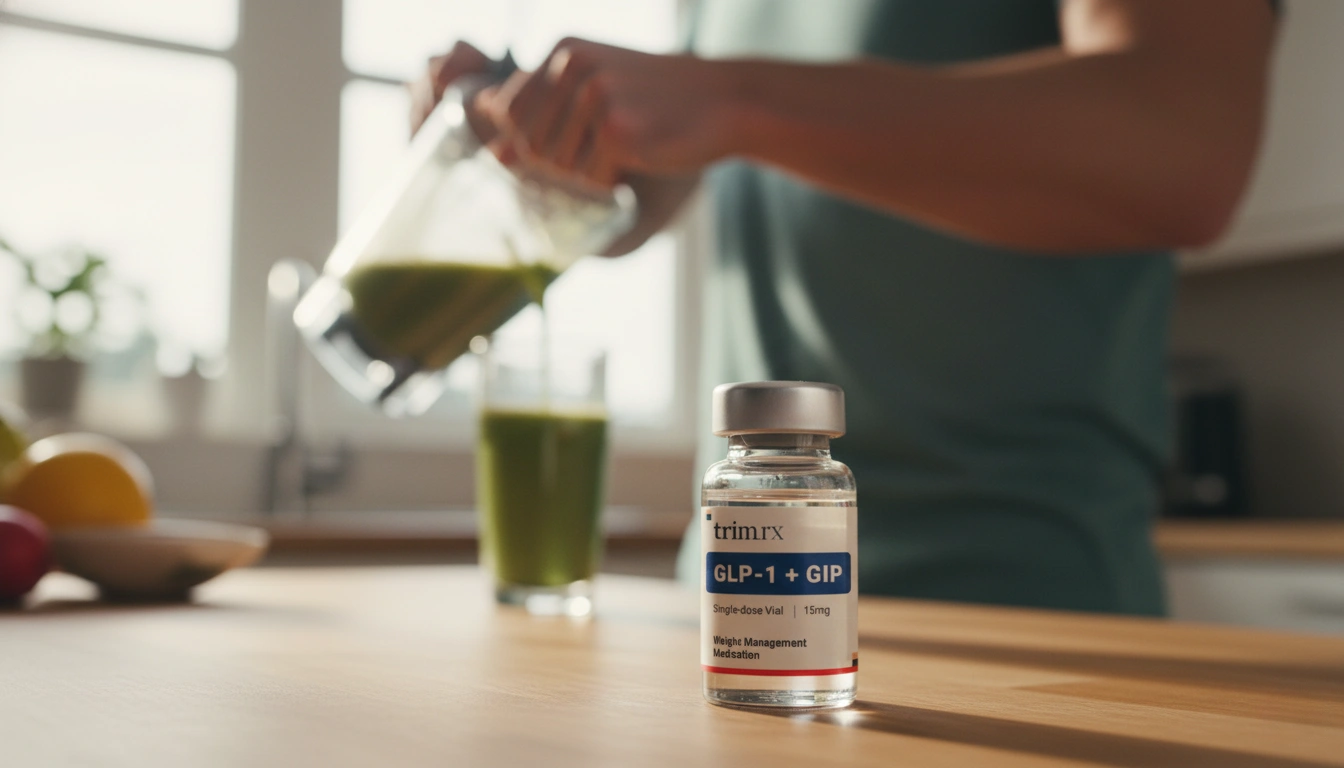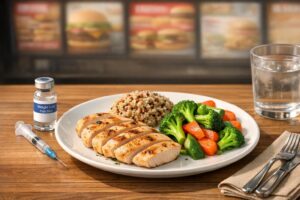What Not to Take with GLP-1 Medications: Essential Guidelines for Safe Usage

Introduction
Imagine stepping onto the scale after months of dedicated effort, only to see the numbers drop significantly. For many, this moment is a testament to hard work, commitment, and sometimes the right medication. GLP-1 medications, such as Semaglutide and Tirzepatide, have emerged as transformative tools in the fight against obesity and Type 2 diabetes, helping countless individuals achieve their weight loss and health goals. However, with great power comes great responsibility.
While these medications can be incredibly effective, there are critical considerations regarding what you should avoid taking alongside them. Understanding the interactions and restrictions can not only enhance the effectiveness of your treatment but also safeguard your health.
In this blog post, we will explore the nuances of GLP-1 medications, what not to take with them, and how to create a supportive environment for your weight loss journey. We will delve into the recommended dietary practices, medications to avoid, and the importance of consulting healthcare professionals to ensure a safe and effective experience. By the end of this post, you will have a clearer understanding of how to navigate your GLP-1 treatment safely.
Understanding GLP-1 Medications
What are GLP-1 Medications?
GLP-1, or glucagon-like peptide-1, medications are a class of drugs designed primarily to manage Type 2 diabetes and promote weight loss. These medications mimic the action of the naturally occurring GLP-1 hormone in the body, which plays a crucial role in regulating blood sugar levels and appetite. They work by stimulating insulin secretion, suppressing glucagon release, and slowing gastric emptying, which leads to increased satiety and reduced food intake.
Some of the well-known GLP-1 medications include:
- Semaglutide (available as Ozempic® for diabetes and Wegovy® for weight loss)
- Tirzepatide (Mounjaro®)
- Liraglutide (Victoza® for diabetes and Saxenda® for weight loss)
These medications have shown considerable efficacy in clinical settings, leading to significant weight loss and improved glycemic control for many patients.
How GLP-1 Medications Work
To fully appreciate the importance of understanding what not to take with GLP-1 medications, it’s crucial to know how they function. By mimicking GLP-1, these drugs effectively lower blood sugar levels and promote weight loss through several mechanisms:
- Increased Insulin Secretion: They enhance insulin release in response to meals, helping to control postprandial blood sugar spikes.
- Decreased Glucagon Secretion: They suppress glucagon, a hormone that raises blood sugar levels, thereby preventing excessive glucose production from the liver.
- Delayed Gastric Emptying: By slowing the rate at which food leaves the stomach, they promote feelings of fullness and reduce overall calorie intake.
The Role of TrimRx
At TrimRx, we are dedicated to helping individuals achieve their weight loss goals through personalized, medically supervised programs. Our approach combines the latest telehealth innovations with effective weight loss solutions, ensuring that our patients receive the individualized care they deserve. If you are interested in exploring our personalized weight loss programs, we encourage you to take our free assessment quiz to determine your eligibility for our prescription weight loss medications.
Take the free assessment quiz here!
What Not to Take with GLP-1 Medications
While GLP-1 medications can significantly enhance weight loss and improve blood sugar control, certain medications and substances can interfere with their effectiveness or exacerbate side effects. Below, we outline the key categories of what to avoid while taking GLP-1 medications.
1. Other Medications that Lower Blood Sugar
One of the primary concerns when taking GLP-1 medications is the risk of hypoglycemia, or low blood sugar. When used in conjunction with other medications that also lower blood sugar, such as insulin or sulfonylureas (e.g., glipizide, glyburide), the risk of hypoglycemia increases significantly. This is particularly important for individuals who may already have fluctuating blood sugar levels.
Recommendations:
- Consult Your Healthcare Provider: Always discuss your medication regimen with your healthcare provider to avoid potential interactions.
- Monitor Blood Sugar Levels: If you are prescribed additional medications that affect blood sugar, regular monitoring is crucial.
2. High-Fat and High-Calorie Foods
While not a direct medication interaction, certain dietary choices can undermine the effectiveness of GLP-1 medications. High-fat and high-calorie foods can counteract the appetite-suppressing effects of these medications, leading to reduced weight loss success.
Recommendations:
- Focus on Nutrient-Dense Foods: Aim for a diet rich in lean proteins, whole grains, fruits, and vegetables to maximize the benefits of GLP-1 medications.
- Stay Hydrated: Drinking plenty of water can help support your weight loss journey and reduce gastrointestinal side effects associated with GLP-1 medications.
For additional support during your weight loss journey, consider our quick-access supplements, such as GLP-1 Daily Support and Weight Loss Boost, which can complement your diet.
3. Alcohol
Alcohol can affect the liver and may also influence blood sugar levels. Consuming alcohol while on GLP-1 medications can increase the risk of liver toxicity and exacerbate gastrointestinal side effects such as nausea and vomiting.
Recommendations:
- Limit Alcohol Consumption: If you choose to drink, do so in moderation and discuss your alcohol intake with your healthcare provider to ensure it aligns with your treatment plan.
4. Foods High in Sugar and Refined Carbohydrates
Foods high in sugar and refined carbohydrates can lead to rapid blood sugar spikes, which GLP-1 medications are designed to prevent. Consuming these foods can compromise the efficacy of the medication and hinder weight loss efforts.
Recommendations:
- Avoid Processed Sugars: Limit foods like candies, pastries, and sugary drinks, which can lead to increased cravings and hinder your weight loss goals.
5. Compounded Medications
While compounded medications may seem like a viable option, they have not undergone the same rigorous testing and approval processes as FDA-approved drugs. This lack of oversight can lead to inconsistencies in dosing and potential side effects.
Recommendations:
- Stick to FDA-Approved Medications: Always opt for FDA-approved medications when possible, and discuss any compounded options with your healthcare provider to assess their safety.
Conclusion
Navigating the world of GLP-1 medications can be a transformative journey toward better health and weight management. However, understanding what not to take with these medications is essential for maximizing their effectiveness and minimizing potential risks. By being mindful of your dietary choices and medication interactions, you can create a supportive environment for your treatment.
At TrimRx, we are here to support you every step of the way. From personalized weight loss programs to compassionate care, our goal is to help you achieve sustainable weight loss with the right tools and guidance. If you’re ready to take control of your health and explore our personalized options, we encourage you to take our free assessment quiz.
FAQ
Can I take GLP-1 medications if I am on other diabetes medications?
Yes, but it’s essential to consult your healthcare provider. Combining GLP-1 medications with other diabetes medications that lower blood sugar can increase the risk of hypoglycemia.
What should I do if I experience side effects while taking GLP-1 medications?
If you experience significant side effects, it’s crucial to contact your healthcare provider. They can assess whether adjustments to your treatment plan are necessary.
Are there specific foods I should avoid while on GLP-1 medications?
Yes, it’s best to avoid high-fat, high-calorie foods, foods high in sugar, and refined carbohydrates, as these can counteract the benefits of GLP-1 medications.
How can I support my weight loss efforts while taking GLP-1 medications?
Focus on a balanced diet rich in whole foods, stay hydrated, and consider incorporating supportive supplements like those offered by TrimRx. Additionally, regular physical activity can enhance your results.
Is it safe to drink alcohol while on GLP-1 medications?
Moderation is key. Alcohol can affect liver function and blood sugar levels, so it’s best to discuss your alcohol consumption with your healthcare provider.
By following these guidelines and seeking personalized advice, you can enhance your experience with GLP-1 medications and work towards achieving your weight loss and health goals.

Transforming Lives, One Step at a Time
Keep reading
China’s Supreme Court Upholds Semaglutide Patent for Novo Nordisk
China’s Supreme People’s Court upholds Novo Nordisk’s semaglutide compound patent, supporting IP protection.
Over 600,000 Californians Risk Losing Access to GLP-1 Weight-Loss Drugs
California’s Medi-Cal will stop covering GLP-1 weight-loss drugs for weight-loss-only prescriptions, effective Jan. 1, 2026.
Weight-Loss Pill Approval Likely to Prompt Overhaul of Packaged Food and Fast-Food Products
FDA approval of GLP-1 weight-loss pills may prompt food makers and restaurants to shift to high-protein, smaller-portion products.



